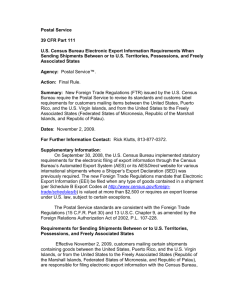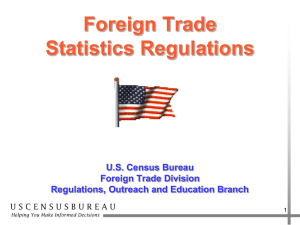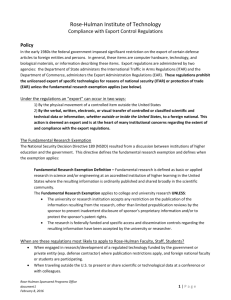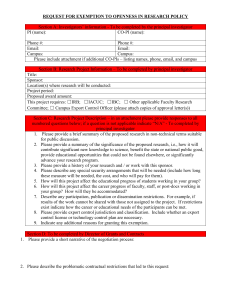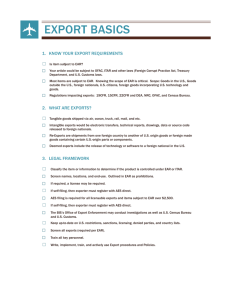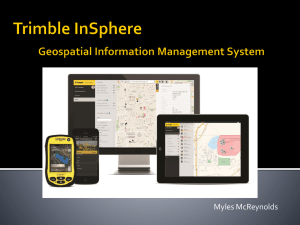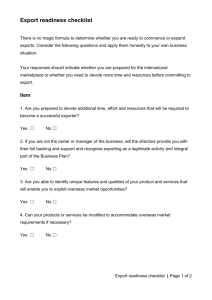Postal Service
advertisement
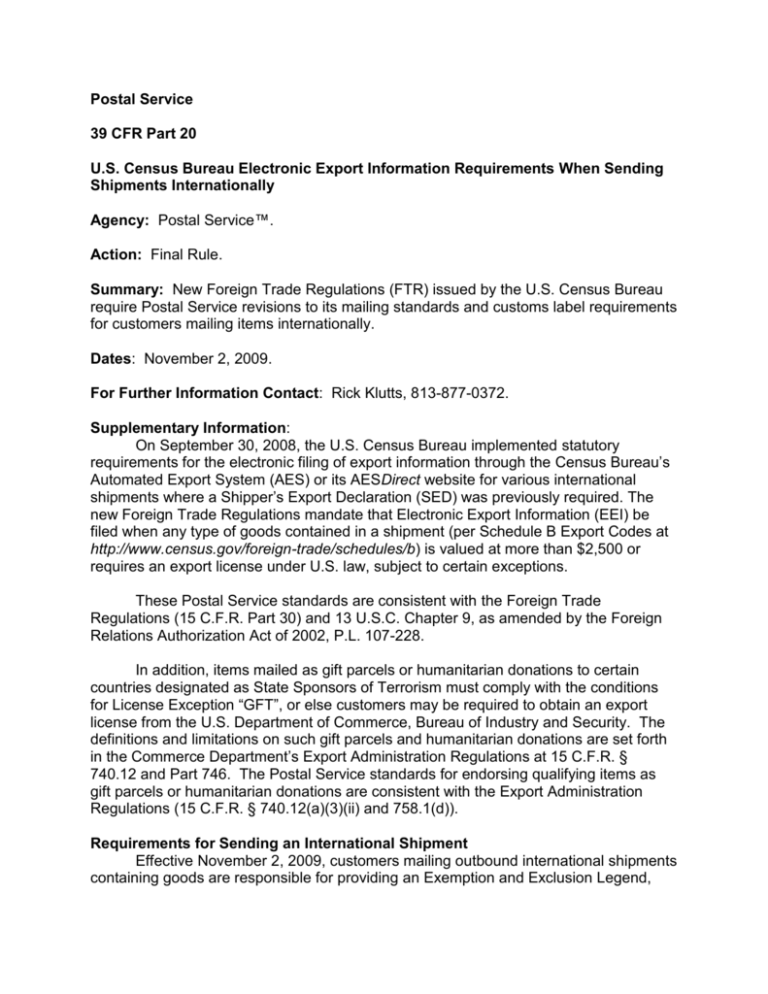
Postal Service 39 CFR Part 20 U.S. Census Bureau Electronic Export Information Requirements When Sending Shipments Internationally Agency: Postal Service™. Action: Final Rule. Summary: New Foreign Trade Regulations (FTR) issued by the U.S. Census Bureau require Postal Service revisions to its mailing standards and customs label requirements for customers mailing items internationally. Dates: November 2, 2009. For Further Information Contact: Rick Klutts, 813-877-0372. Supplementary Information: On September 30, 2008, the U.S. Census Bureau implemented statutory requirements for the electronic filing of export information through the Census Bureau’s Automated Export System (AES) or its AESDirect website for various international shipments where a Shipper’s Export Declaration (SED) was previously required. The new Foreign Trade Regulations mandate that Electronic Export Information (EEI) be filed when any type of goods contained in a shipment (per Schedule B Export Codes at http://www.census.gov/foreign-trade/schedules/b) is valued at more than $2,500 or requires an export license under U.S. law, subject to certain exceptions. These Postal Service standards are consistent with the Foreign Trade Regulations (15 C.F.R. Part 30) and 13 U.S.C. Chapter 9, as amended by the Foreign Relations Authorization Act of 2002, P.L. 107-228. In addition, items mailed as gift parcels or humanitarian donations to certain countries designated as State Sponsors of Terrorism must comply with the conditions for License Exception “GFT”, or else customers may be required to obtain an export license from the U.S. Department of Commerce, Bureau of Industry and Security. The definitions and limitations on such gift parcels and humanitarian donations are set forth in the Commerce Department’s Export Administration Regulations at 15 C.F.R. § 740.12 and Part 746. The Postal Service standards for endorsing qualifying items as gift parcels or humanitarian donations are consistent with the Export Administration Regulations (15 C.F.R. § 740.12(a)(3)(ii) and 758.1(d)). Requirements for Sending an International Shipment Effective November 2, 2009, customers mailing outbound international shipments containing goods are responsible for providing an Exemption and Exclusion Legend, 2 Proof of Filing Citation (PFC), or AES Downtime Citation. Goods mailed to APO/FPO/DPO (DMM 703.2) addresses are not subject to this standard. Section 30.71 of the Federal Trade Regulations establishes civil and criminal penalties for customers who fail to electronically file their export information when required, or to comply with the Foreign Trade Regulations in any other way. Electronic Export Information Filing; Proof of Filing Citation Subject to exemptions and exclusions, as set forth below, electronic filing of export information and a Proof of Filing Citation (PFC) are required when: 1. Any type of goods contained in a shipment (per Schedule B Export Codes at http://www.census.gov/foreign-trade/schedules/b) is valued at more than $2,500. 2. The package is shipped to certain countries designated as State Sponsors of Terrorism (see Country Group E:1 in the Export Administration Regulations, 15 C.F.R. Part 740, Supplement No. 1) and does not qualify as a “gift parcel or humanitarian donation” under 15 C.F.R. § 740.12. As of August, 2009, these countries are: a. Cuba. b. Iran. c. People’s Democratic Republic of Korea (North Korea). d. Sudan. e. Syrian Arab Republic (Syria). 3. The package requires an export license. To determine if an export license is required, go to http://www.export.gov/regulation/index.asp or call:1-800-USATRAD(E). When any of these three circumstances apply, it is the mailer’s responsibility to electronically file export information before mailing; a paper Shipper’s Export Declaration (SED) is no longer accepted. Electronic export information is filed through the U.S. Census Bureau’s Automated Export System (AES) or AESDirect website utilizing the following steps: Log on to www.aesdirect.gov and follow the instructions for registering and completing the AES Certification Quiz. The “Port of Export” code for shipping through the Postal Service is “8000”. The “Mode of Transport” is “Mail”. The carrier should be left as “SCAC/IATA,” and the conveyance name fields should remain blank. After the mailer has successfully filed the electronic export information, the mailer will be provided with an alphanumeric Internal Transaction Number as confirmation. When mailing, the PFC will consist of the letters “AES” followed by the Internal Transaction Number (ITN): for example, “AES X20080930987654”. Note: If the AES system is down, call 1-800-549-0595, option 1. AES Downtime Citation If export information filing is required but AES or AESDirect is unavailable, the goods may be shipped but the mailer is responsible for providing the appropriate AES 3 Downtime Citation. This citation includes the word “AESDOWN,” the mailer’s AES filer identification number, and the date: for example, “AESDOWN 123456789 09/30/2009”. Exemption and Exclusion Legends If no class of goods within the package is valued at more than $2,500 and an export license is not required, the customer should enter the exemption code “NOEEI 30.37(a)” on the customs declaration form, unless the goods are being shipped to Cuba, Iran, North Korea, Sudan, or Syria. If one or more classes of goods within the package is valued at more than $2,500, another exemption code might apply, such as “NOEEI 30.36” (goods shipped to Canada, subject to certain exceptions). For a complete listing, see Appendix C to 15 C.F.R. Part 30. Exemption and Exclusion Legends cannot be applied to packages that require an export license. In such cases, customers are responsible for filing, or attempting to file, electronic export information through the AES website and apply a PFC or AES Downtime Citation to the customs declaration form. For gift parcels and humanitarian donations, as defined in 15 C.F.R. § 740.12, mailed to certain countries designated as State Sponsors of Terrorism (see Country Group E:1 in the Export Administration Regulations, 15 C.F.R. Part 740, Supplement No. 1), customers may use exemption code “NOEEI 30.37(h).” In addition, the item must be endorsed with the marking “GIFT — Export License Not Required” on the addressee side of the package, and the symbol “GFT” must be written in the same block as the Exemption and Exclusion Legend on the applicable required customs declaration, as described below. Entering Required, PFC, AES Downtime Citation, or Exemption and Exclusion Legend The PFC, AES Downtime Citation, or Exemption and Exclusion Legend can be marked on the applicable customs declaration form as follows: On PS Form 2976-A, Customs Declaration and Dispatch Note — CP72 (large white form) customers should write one PFC, AES Downtime Citation, or applicable Exemption and Exclusion Legend in Block 11. On older versions of PS Form 2976-A printed prior to January 2009, customers should write one PFC, AES Downtime Citation, or applicable Exemption and Exclusion Legend at the top of the form or in any clear space. Avoid writing over the barcode on the form. On PS Form 2976, Customs Declaration — CN22 (September 2009, version) customers should check “30.37(a)” or “30.37(h)” in Block 7 of the form, depending on the applicable Exemption and Exclusion Legend. On older versions of PS Form 2976, Customs Declaration — CN22 (small green form) customers should write one applicable Exemption and Exclusion Legend (“30.37(a)” or “30.37(h)”) on the green portion of the form. On Label 11FGG1, Global Express Guaranteed (GXG), International Air Waybill (Mailing Label), printed prior to August 2008, customers should write “30.37(a)” 4 next to the sender’s signature. Current versions have this Exemption and Exclusion Legend included on the GXG mailing label. Note: These standards also apply to mailers who produce privately printed customs declaration forms. Responding to Customer Questions Customers needing further assistance with AES filing requirements should contact the U.S. Census Bureau on its toll-free hotline at 1-800-549-0595: Option 1 – AES Assistance Option 2 – Commodity Classification Assistance Option 3 – Regulatory Assistance Customers may also obtain a copy of Publication 613, New U.S. Census Bureau Regulations: What Mailers Need to Know When Shipping an International Package, from any U.S. Postal Service retail unit. The Postal Service adopts the following changes to Mailing Standards of the United States Postal Service, International Mail Manual (IMM®), which is incorporated by reference in the Code of Federal Regulations. See 39 CFR 20. List of Subjects in 39 CFR Part 20 Foreign relations, International postal services. Accordingly, 39 C.F.R. Part 20 is amended as follows: Part 20 – [Amended] 1. The authority citation for 39 C.F.R. Part 20 is revised to read as follows: Authority: 5 U.S.C. 552(a); 13 U.S.C. 301-307; 39 U.S.C. 101, 401, 403, 404, 407, 414, 416, 3001–3011, 3201–3219, 3403–3406, 3621, 3622, 3626, 3632, 3633, and 5001. 2. Revise the following sections of Mailing Standards of the United States Postal Service, International Mail Manual (IMM) as follows: Mailing Standards of the United States Postal Service, International Mail Manual (IMM) 1 International Mail Services * 120 * * * * Preparation for Mailing * 123 * * * * Customs Declaration Forms and Online Shipping Labels 5 * * * * * 123.7 Completing Customs Declaration Forms 123.71 PS Form 2976, Customs Declaration CN 22 — Sender’s Declaration (green label) * * * * * 123.712 Postal Service Employee’s Acceptance of PS Form 2976 * * * * * [Add new item e as follows:] e. To comply with U.S. Census Bureau requirements, it is the customer’s responsibility to ensure an appropriate Exemption and Exclusion Legend is selected or displayed on the PS Form 2976. * * * * * 123.72 PS Form 2976–A, Customs Declaration and Dispatch Note — CP 72 * * * * * 123.722 Postal Service Employee’s Acceptance of PS Form 2976-A * * * * * [Insert new item c as follows and redesignate existing items c through g as new items d through h] c. To comply with U.S. Census Bureau requirements, it is the customer’s responsibility to ensure that an appropriate Exemption and Exclusion Legend, Proof of Filing Citation, or AES Downtime Citation is displayed on the PS Form 2976-A. If this information is not entered, remind the customer that he or she may be subject to civil and criminal penalties for noncompliance. * * * * * 5 Nonpostal Export Regulations * * * * * [Delete current 521 through 524. Insert new 520-527 to read as follows:] 520 Foreign Trade Regulations — U.S. Census Bureau 521 General This section describes the various U.S. Department of Commerce, U.S. Bureau of the Census requirements when shipping goods internationally. In certain circumstances, customers are responsible for entering information on the PS Form 2976 or 2976-A. Customers may be subject to civil and criminal penalties if they fail to electronically file their export information when required, or if they fail to comply with the Foreign Trade Regulations in any other way. 6 522 Additional Assistance Customers needing further assistance with filing requirements should contact the U.S. Census Bureau on its toll-free hotline at 1-800-549-0595: Option 1 – AES Assistance Option 2 – Commodity Classification Assistance Option 3 – Regulatory Assistance 523 Mailpieces Sent To APOs, FPOs, and DPOs Goods mailed to APO/FPO/DPO addresses are not subject to the Foreign Trade Regulations. Accordingly, customers are not required to file electronic export information via the U.S. Census Bureau’s Automated Export System or AESDirect website for such mailings, and they do not need to present a Proof of Filing Citation, AES Downtime Citation, or Exemption and Exclusion Legend. 524 Proof of Filing Citation (PFC) 524.1 General Under the authority of 13 U.S.C. Chapter 9, as amended by the Foreign Relations Authorization Act of 2002, P.L. 107-228, U.S. Census Bureau regulations require electronic filing of export information through the Census Bureau’s Automated Export System (AES) or AESDirect website for certain outbound international shipments of goods. Before mailing, customers subject to this filing requirement are responsible for presenting a Proof of Filing Citation (PFC) or AES Downtime Citation as evidence of compliance. The Census Bureau’s regulations mandate that electronic export information be filed when any type of goods contained in a shipment (per Schedule B Export Codes at www.census.gov/foreign-trade/schedules/b) is valued at more than $2,500, requires an export license under U.S. law, or is being sent to certain countries designated as State Sponsors of Terrorism, subject to certain exceptions. Following are three examples to illustrate the value criterion: Example 1: An insured Priority Mail International package contains one mechanically operated watch (Schedule B item # 9101.11.0000) valued at $2600. The total value of goods to be mailed is $2600, and the value of all items within the same Schedule B number is over $2500. Consequently, electronic filing and a PFC would be required (unless an exemption or exclusion applies). Example 2: An insured Priority Mail International package contains one mechanically operated watch (Schedule B item # 9101.11.0000) valued at $2400, and one electronically operated watch (Schedule B item# 9101.91.0000) valued at $2400. The total value of goods to be mailed is $4800, but no group of items within the same Schedule B number is valued over $2500. Consequently, electronic filing and a PFC would not be required because the mechanical watch and electronic watch are in different Schedule B groups. 7 Example 3: An insured Priority Mail International package contains two mechanically operated watches (Schedule B item # 9101.11.0000) one valued at $1400 and one valued at $1500. The total value of goods to be mailed is $2900 and the value of all items within the same Schedule B number is over $2500. Consequently, electronic filing and a PFC would be required (unless an exemption or exclusion applies). 524.2 Filing Requirements 524.21 Mandatory Filing Electronic filing of export information is required when any of the following applies: a. One or more classes of goods (per Schedule B Export Codes at www.census.gov/foreign-trade/schedules/b) within the item is valued at more than $2,500, unless the shipment falls under an exemption or exclusion. See 520.6. b. The item requires an export license under U.S. law. c. The shipment is destined to a designated State Sponsor of Terrorism country (per Country Group E:1 in the Export Administration Regulations, 15 C.F.R. Part 740, Supplement No. 1) and the shipment does not qualify as a “gift parcel or humanitarian donation” as defined by 15 C.F.R. § 740.12. See 520.6. Note: Currently, the State Sponsors of Terrorism countries are: 1. Cuba. 2. Iran. 3. The Democratic People’s Republic of Korea (North Korea). 4. Sudan. 5. The Syrian Arab Republic (Syria). 524.22 How to File Electronic Export Information and Obtain a Proof of Filing Citation To file electronic export information through AESDirect and obtain a PFC, customers should use the following steps: a. Go to www.aesdirect.gov. b. Register for an AESDirect account or log into your existing account. c. Follow the instructions for the AES Certification Quiz. d. The ”Port of Export” code for shipping through the Postal Service is “8000”. e. The “Mode of Transport” is “Mail”. f. Leave the carrier as ’SCAC/IATA‘ and the conveyance name fields blank. g. After successfully filing electronic export information, AESDirect will provide an alphanumeric Internal Transaction Number (ITN) as confirmation. The PFC consists of the letters “AES” followed by the ITN: for example, “AES X20080930987654”. For additional information on electronic filing, call the U.S. Census Bureau’s toll-free information hotline at 800-549-0595, option #3. 8 525 AES Downtime Citation If electronic information filing is required but AES or AESDirect is unavailable, the goods may be shipped but the customer is responsible for providing the appropriate AES Downtime Citation instead of a PFC. This citation includes the word “AESDOWN,” the customer’s AES filer identification number, and the date: for example, “AESDOWN 123456789 09/30/2009.” 526 Exemption and Exclusion Legend 526.1 General In many circumstances, electronic export information filing and a PFC may not be required when mailing goods internationally. In these circumstances, customers are directed to apply an applicable Exemption and Exclusion Legend on the customs declaration form upon mailing. The following conditions apply: a. One Exemption and Exclusion Legend may be entered per addressed mailpiece. When multiple exemptions may apply, the mailer may select any one that applies. b. Exemption and Exclusion Legends cannot be applied to shipments if an export license is required. 526.2 When Applicable Customers with shipments not meeting the mandatory filing requirements under 520.41 may apply the exemption legends such as the following on the customs declaration form: 1. “NOEEI 30.37(a)” for shipments when the value of each class of goods is $2,500 or less, when an export license is not required. This exemption cannot be applied to shipments to designated State Sponsors of Terrorism countries. 2. “NOEEI 30.36” for shipments to Canada, when an export license is not required. 3. “NOEEI 30.37(h)” for shipments of gift parcels and humanitarian donations as defined in 15 C.F.R. § 740.12. This exemption may apply to qualifying shipments to the designated State Sponsors of Terrorism countries identified in 520.41(c). In addition, the item must be endorsed with the marking “GIFT — Export License Not Required” on the addressee side of the package, and the symbol “GFT” must be written in the same block as the Exemption and Exclusion Legend on the applicable required customs declaration, as described in 527. Note: For more information and a complete listing of these and other exemption and exclusion legends, see Appendix C of the Foreign Trade Regulations, 15 C.F.R. Part 30. 527 Placement of PFC, AES Downtime Citation, or Exemption and Exclusion Legend When shipments require a PFC, AES Downtime Citation, or Exemption and Exclusion Legend, it is the customer’s responsibility to legibly write the PFC, AES Downtime Citation, or Exemption and Exclusion Legend on the applicable customs declaration form as follows: 9 a. On PS Form 2976-A, Customs Declaration and Dispatch Note — CP72 (large white form), customers should write one PFC, AES Downtime Citation, or Exemption and Exclusion Legend in Block 11. b. On older versions of PS Form 2976-A printed prior to January 2009, customers should write one PFC, AES Downtime Citation, or Exemption and Exclusion Legend at the top of the form or in any clear space. Avoid writing over the barcode on the form. c. On PS Form 2976, Customs Declaration — CN22 (September 2009 version), customers should check “30.37(a)” or “30.37(h)” in Block 7 of the form, depending on the applicable Exemption and Exclusion Legend. d. On older versions of PS Form 2976, Customs Declaration — CN22 (small green form), customers should write one applicable Exemption and Exclusion Legend (“30.37(a)” or “30.37(h)”) in the margin on the green portion of the form. e. On Label 11FGG1, Global Express Guaranteed (GXG), International Air Waybill (Mailing Label) printed prior to August 2008, customers should write “NOEEI 30.37(a)” next to the sender’s signature. Current versions have this exemption legend included on the GXG mailing label. Note: These standards also apply to mailers who produce privately printed customs declaration forms under 123.3. * * * * Neva R. Watson Attorney, Legislative [END DOCUMENT] *

